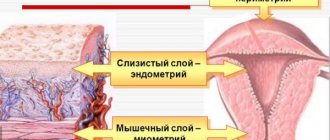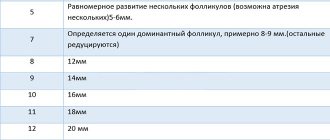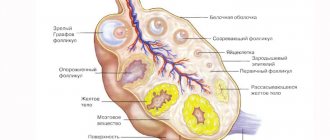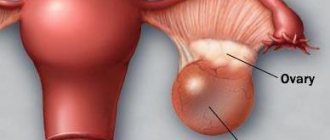Authors | Last updated: 2020
A follicular ovarian cyst is a benign cavity formation that is located inside the organ and is filled with clear, less often hemorrhagic, fluid. It is detected mainly in young women, and is often found in adolescents. It has hormonal activity and disrupts the menstrual cycle. Without treatment it leads to the development of uterine bleeding and pelvic pain.
Follicular cyst and pregnancy are not compatible. This disease prevents ovulation and fertilization. In rare cases, a cyst is detected during pregnancy. It is recommended to get rid of the pathology before conceiving a child. Otherwise, the risk of complications increases, including termination of pregnancy.
general description
It is important to remember that a follicular cyst is a benign neoplasm that is filled with fluid. It cannot be reborn. The pathology occurs quite often, and in women of reproductive age. It occurs on the surface of the left or right ovary if the egg does not come out of it.
The pathology is characterized by the following symptoms:
- increased urination;
- severe pain in the lower abdomen during menstruation, with discomfort observed only on one side;
- missed period or excessive bleeding;
- general malaise.
It should be noted that the cyst can appear even when it reaches a significant size. That is, even when pregnant, a woman may not know about the problem until later.
Symptoms
The symptoms of this disease are quite pronounced, although in some cases it goes completely unnoticed. You can suspect that you have an ovarian cyst based on the following symptoms. However, the final diagnosis can be made accurately by a doctor.
- Severe pain. Pulling periodic pains in the lower abdomen always indicate to a woman some kind of trouble within her body. If these signs are persistently ignored, a rather large neoplasm will eventually develop, which will still have to be treated. The pain intensifies during menstruation, lifting weights, any physical activity, and nervous tension. Sometimes they are also accompanied by a headache and a feeling of constant fatigue. As a result, a woman feels completely overwhelmed and depressed, her emotional background, relationships with herself and loved ones begin to suffer. Severe pain should never be tolerated; it is necessary to understand its causes as soon as possible!
- Dizziness. Problems in women's health are often accompanied by severe dizziness and decreased blood pressure. Nausea and even vomiting may occur. If such manifestations occur relatively often, it is worth making an appointment with your gynecologist.
- Sudden change of mood. It is known that the phase of the menstrual cycle greatly influences the perception of the surrounding reality. In the case of the formation of a follicular cyst, a woman often becomes overly impressionable. Any little thing can offend her to a large extent and lead to despondency. Irritation is especially strongly expressed when there are appropriate prerequisites for this in the family.
Conception and follicular cyst
Is it possible to get pregnant with a follicular cyst?
In most cases, no. But, if a woman has a regular monthly cycle and there are no disruptions, then conception is quite possible. If the menstrual cycle is normal, then on average by the 14th day the follicle matures and bursts, after which the egg enters the fallopian tube and moves towards the uterus. That is, ovulation occurs. If the follicle remains intact, then this process is disrupted and pregnancy does not occur. In addition, the large size of the formation contributes to compression of the fallopian tubes. Therefore, if the egg does appear, it cannot be fertilized. The neoplasm promotes the formation of adhesions that disrupt the normal patency of the appendages.
Conception is prevented by an increase in estrogen levels, which suppresses the synthesis of progesterone, which is responsible for the preservation and development of pregnancy. Since the inability to become pregnant for a woman is an additional psychological trauma, the body begins to produce substances that disrupt hormonal levels.
Pregnancy with a follicular ovarian cyst is possible if:
- The cyst on the left ovary (or right) resolved, and it began to work correctly.
- The functionality of the second ovary was normalized.
In general, it is theoretically possible to conceive a baby in such a situation, but it is very difficult to do. In addition, a growing tumor can rupture, posing a threat to the life of the expectant mother and requiring urgent surgical intervention.
How does it affect pregnancy?
Do not forget that during pregnancy a woman’s hormonal levels change greatly, and hormone-dependent tumors (for example, an endometrioid cyst) can begin to grow sharply. In most cases, a paraovarian cyst has nothing to do with hormones, does not grow during pregnancy, and the risks of damage to it if it is small (up to 3 cm) in size are minimal.
The corpus luteum cyst will resolve on its own as the fetus develops.
Expert opinion
Olga Matveeva
Gynecologist-obstetrician Experience 6 years
In some cases, neoplasms on the ovaries during pregnancy even decrease or disappear altogether. But you shouldn’t count on this, since they are just as likely to start and grow.
Pregnancy after cyst treatment
The simultaneous presence of a follicular ovarian cyst and pregnancy are not entirely compatible concepts. But if you get rid of the tumor, then the woman will be able to conceive a baby, but this will not happen right away. First, hormonal levels must be restored, as well as the menstrual cycle. Throughout the entire recovery period, you need to undergo scheduled checks and ultrasound diagnostics.
It is also important to avoid nervous and physical overload, stress, eat right and strengthen your immune system. For any health problems, do not self-medicate, but consult a specialist.
If you cannot get pregnant naturally because irreversible changes have occurred in the ovaries or fallopian tubes themselves, you can resort to in vitro fertilization. But it is allowed only after the tumor has been cured. For example, a cyst larger than 2 cm is a direct contraindication to fertilization. That is, patients will have to wait up to 6 months to start the protocol.
The IVF procedure itself can also provoke the growth of a cyst, because during its implementation the woman receives a huge amount of estrogens.
How is the treatment carried out?
An accurate diagnosis cannot be made on your own. This procedure can only be performed by a specialist in a medical facility.
Follicular cysts can be detected using ultrasound. In addition, diagnostic laparoscopy will help to understand that a woman has such a disease.
Also, to detect a cyst, vaginal examination and hormonal tests are used.
Read: 7 days delay, negative test: causes of pathology
In order to completely rule out possible conception outside the uterus, a pregnancy test is performed. The fact is that the symptoms of this condition are very similar to a cyst.
After examining the internal growth, the specialist may recommend that the patient postpone treatment for a while. During this time, the cyst may completely disappear in about two menstrual cycles. In such situations, experts recommend paying attention to proper nutrition, as well as completely eliminating all bad habits.
Hormones are used to treat follicular cysts. These are mainly oral contraceptives.
In addition, they eliminate all inflammatory processes in the body.
As for surgical intervention, it is resorted to only in 6% of cases when the cyst has ruptured, twisted or become large.
The best way to prevent the occurrence of a cyst is regular examination at a medical facility at least once every 6 months, eliminating any stress and nervous tension.
On the video - more about the pathology:
30 Sep 2021 Yuki 362
Share this post
We recommend reading along with this article
- What is autoimmune thyroiditis, clinical picture of the disease in community terms
- Early ectopic pregnancy: symptoms and signs
- Is pregnancy possible after removal of an ovarian cyst?
- Periods last longer than 10 days - pathology or normal?
- How pregnancy manifests itself in the early stages: signs before delay
- How does ectopic pregnancy occur, symptoms of the disease
- Belly in early pregnancy: different sensations
- The problem of married couples - how to get pregnant accurately and quickly
- When can a woman become pregnant and is it possible to count the days in...
What to do if a tumor appears
If there are no follicles, there is a delay in menstruation, and even a cyst has appeared on the ovary - do not panic (this will only worsen the condition). It is important to trust a competent specialist and begin treatment. A woman is most often prescribed conservative therapy to promote the resorption of the tumor. Next, treatment is aimed at restoring the functionality of the ovaries.
If the cyst is small, does not tend to grow, and does not affect the level of hormones in a woman’s blood, then doctors allow and even recommend pregnancy. In this state, significant changes occur in the body, so the tumor can resolve on its own.
In the presence of a large cyst, we are talking about temporary infertility. But it can be cured if all measures are carried out on time and correctly. A pregnant woman is at risk of rupture of the tumor due to the pressure of the growing uterus on it. In this case, the patient is prescribed laparoscopic surgery to remove it. However, such a situation is very rare.
There are 2 ways to treat cysts:
- Conservative. It is used in most cases.
- Surgical. Necessary for torsion of the cyst stalk, rupture of the formation, presence of internal bleeding, ineffectiveness of drug therapy.
The first option is the main one. A woman is prescribed the following medications:
- hormonal agents;
- vitamins;
- herbal preparations to prevent relapse.
For therapy, you can also use folk remedies, for example, tincture of golden mustache. However, the presence of a follicular cyst during pregnancy greatly limits the list of approved drugs. Any medications or folk decoctions must be strictly agreed with your doctor.
If the tumor does not disappear even after treatment and poses a danger to the woman’s health, then it is removed after a cesarean section. The main thing is not to worsen the patient’s condition and give her the opportunity to carry a full-fledged pregnancy.
Is it possible to get pregnant with an ovarian cyst: dangerous or not, possible difficulties
Women who have discovered tumors on the gonads often ask gynecologists whether it is possible to become pregnant with an ovarian cyst. To answer this question, it is necessary to examine the patient. After all, the likelihood of pregnancy is directly related to the type and size of the tumor.
The effect of cysts on reproductive functions
To understand the peculiarities of the influence of cystic formations on the possibility of getting pregnant, you need to find out what types of them exist:
- dermoid;
- endometrioid;
- follicular;
- cystomas;
- corpus luteum cysts;
- polycystic ovaries.
They have virtually no effect on the functioning of the reproductive organs: corpus luteum cyst, follicular and dermoid tumors, cystomas. Women who have developed endometrioid formations and are diagnosed with polycystic ovary syndrome find it difficult to become pregnant.
Important! The occurrence of some types of tumors is due to hormonal imbalances. When they appear, the ovulation process may be disrupted. If the egg does not mature in the follicle or cannot be released, the patient will not be able to become pregnant.
Is pregnancy possible with an ovarian cyst?
Many women manage to get pregnant and carry a child to term even with diagnosed reproductive health problems. But with an ovarian cyst, ovulation is not always possible. If the existing tumor does not prevent the egg from maturing and leaving the follicle, the woman can become pregnant.
With a corpus luteum cyst
A cystic neoplasm in place of the corpus luteum forms after ovulation. It occurs in cases when the corpus luteum, formed in place of the released egg, degenerates into a cystic formation.
It does not interfere with conception in any way. Luteal tumors are often discovered during pregnancy. Their appearance is associated with hormonal imbalance in the body and circulatory disorders in the ovaries. A functional ovarian cyst does not affect the course of pregnancy. It produces progesterone, just like the normal corpus luteum.
With endometrioid cyst
Endometrioid neoplasms appear when intensive growth of tissue identical to the mucous layer of the uterus begins. Such structures are covered with a thick capsule, and there may be adhesions on their surface. Inside endometriotic heterotopias there are remnants of blood that is released during menstruation.
It is almost impossible to get pregnant with endometriotic tumors. Often these problems are identified in women who come to the gynecologist with complaints of infertility.
They are located on both the right and left ovary. Endometriotic growths are detected on the fallopian tubes, the outer uterine layer, and in the pelvic cavity.
In order for the patient to become pregnant, gynecologists recommend first removing the cystic tumors.
Prognosis of cysts during pregnancy
If the neoplasm preceded conception, then by about the 20th week it should resolve on its own, since the hormonal background changes and the cyst does not receive nourishment. In this case, virtually no treatment is required.
During pregnancy, this situation is completely excluded. Pathology does not occur in pregnant women, since this is prevented by excessive production of prolactin. In general, a follicular cyst is a harmless neoplasm, but it requires a woman’s constant attention to her health.










